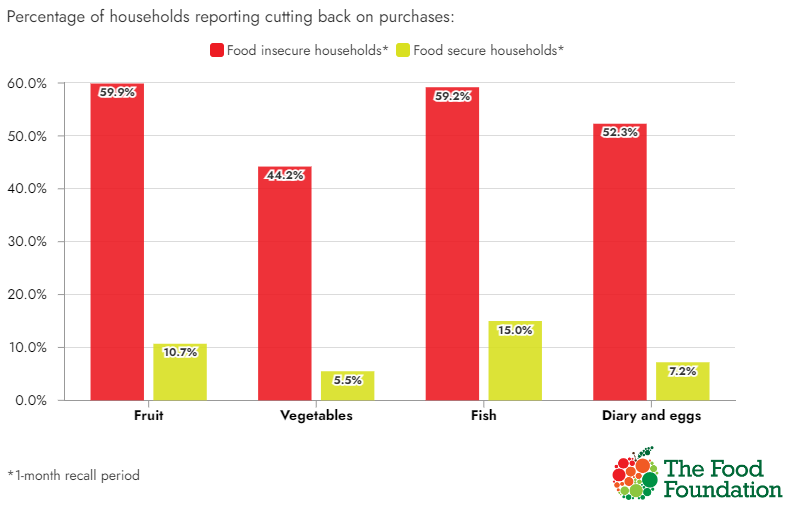Millions of UK citizens are now living in food insecurity, regularly skipping meals and going hungry because they could not afford to buy groceries, new data has revealed.
In January 2024, 15% of UK households (equivalent to approximately 8 millions adults and 3 million children) were found to be living in food insecurity, according the The Food Foundation. Among households with children, 20% are living in food insecurity.
Nearly two-thirds (60%) of food insecure households say they’ve bought less fruit and 44% bought fewer vegetables that normal in January 2024. In comparison, 11% of food secure households bought less fruit, and 6% bought less vegetables within the same time period.
The stats also reveal a fall in the number of food insecure households who report buying fish (59% now buying less) and dairy and eggs (52% now buying less).

Since March 2020, The Food Foundation’s Food Insecurity Tracker has regularly measured the rate of food insecurity in the UK. Current figures have decreased slightly since June 2023, however they still remain twice as high as in 2021.
Healthier options cost, on average, more than twice as much per calorie compared to less healthy options, meaning nutrient rich items are often unaffordable to those living on the breadline. The Food Foundation’s Basic Basket Tracker shows that the price of a reasonably-costed, adequately-nutritious weekly basket of food has increased by 24-26% since April 2022. This means that some of the most vulnerable in society are still in a position where they can’t afford to eat properly.
As a result of it being so difficult to eat healthily, and with food insecurity becoming the norm for many households, poor diet is now the biggest risk factor for preventable disease. The most deprived communities suffer disproportionately from much higher rates of obesity, type 2 diabetes, cardiovascular disease and dental decay, all of which are diet related diseases.
With fruit and veg consumption continuing to decrease amongst those most impacted by the cost of living crisis, food inequalities are getting worse and, in all likelihood, so will health inequalities.
The Food Foundation is calling for the Government to take action of food insecurity in the Spring Budget, ensuring no one in the UK suffers by ensuring that national living wage and benefit levels are set at values that take into account what is required for families to afford a healthy diet.
Other key policies to reduce financial pressure on families should include:
- Committing to the continuation of the Household Support Fund
- Expanding eligibility, improving uptake and increasing the value of the Healthy Start payment
- Increasing access to free school meals by extending the eligibility criteria to all children in families in receipt of Universal Credit, and auto-enrolling all eligible children, with the long term goal of providing Universal Free School Meals.
Anna Taylor Executive Director, The Food Foundation, said, “It is hugely concerning to see that families experiencing food insecurity are now reporting that they are buying less fruit and veg. Often products with the worst health credentials that are high in fat, salt and sugar, or ultra processed are the cheapest option for those who are struggling to afford food to feed themselves or their families. We’ve seen that for this group, fruit and veg is often the first thing to be sacrificed. Everyone should have the right to a healthy diet that will enable them to thrive and policy makers need to step up and acknowledge that this health divide simply isn’t good enough in one of the richest countries in the world”
Michael Marmot, director of the UCL Institute of Health Equity and professor of epidemiology and public health said, “There are fewer needs more basic than nutritious food for you and your children. In the UK in 2024, one in five households with children cannot meet that basic need. They are simply too poor; and the poorer they are the less likely they are to be able to meet that need. The resultant ill-health will most likely make health inequalities worse. Too many people in work are lowly paid, and universal credit does not pay enough to meet basic needs. A healthy society must pay attention.”





